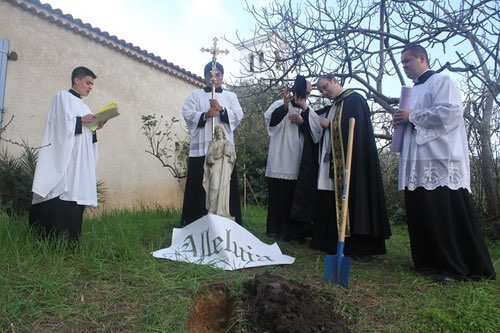
We don’t use “Alleluia” in Lent. In Lent, we call it “the ‘A’ word” (and joke that for some it is “the ‘H’ word”). It is either simply omitted, or else – and this is what this post is about – it is replaced with a different word(s) of praise. In the celebration of the Eucharist, for example, at the acclamation before Gospel, where normally the A word is used, churches regularly use another acclamation of praise.
The ‘A’ word is Hebrew for “Praise the Lord” (“Praise Yah” – cf our best guess at the pronunciation of יהוה, the Divine Tetragrammaton – YHWH). The question arrises: you are simply replacing the Hebrew for “Praise the Lord” with the English “Praise the Lord” – you are simply translating.
This week, I have been delighted to read a three-part explanation by Rev. Dr Benjamin Williams, lecturer at Oxford university, of why the ‘A’ word is not used, but equivalent words are. It’s not about the sentiment; it’s about the language! This post explains why Hebrew is not used (see in full: 1, 2, 3).
Benjamin points to ninth-century Amalarius of Metz who explains that Alleluia’s splendour is due to it being in Hebrew; it is the language that is worthy of honour. Amalarius quotes the 4th-Century Jerome who explained that the Greek and Latin languages are impoverished in comparison to Hebrew! [How much more, hence, is English!] This is why, says Amalarius, during Lent we resort to a humble language, [saying in Latin,] ‘Praise to you, O Lord, King of eternal glory.’
Amalarius goes on to quote Psalm 136/137:4, “How will we sing the Lord’s song in a foreign land?” and continues:
Alleluia and “Glory to God on High” are heavenly songs. For this reason, St John [said] in the book of Revelation [19:1], “After these things, I heard something like a great voice of many crowds in heaven saying, ‘Alleluia!’ With regard to “Glory to God on High”, no one can doubt that it is the song of the angels. It therefore befits us who sit humbled by the waters of Babylon to weep when we remember Zion.
Liber Officialis by Amalarius of Metz translation by Rev. Dr Benjamin Williams
We omit the ‘A’ word not to change the meaning, but to change the language!
Just as the exiles in Babylon couldn’t sing the Lord’s song in a strange land, so in Lent we fast from joining the heavenly Alleluia, praising instead in a humbler language. And Amalarius argues similarly for singing the angelic song “Glory to God in the highest” (even in Greek, Latin,… or English!)
There are varying traditions of ceasing the ‘A’ word before Lent (the photo at the top shows a literal Burying of the Alleluia). Benjamin pointed me to an ancient collect used the day before the ‘A’ word ceases:
Deus qui nos concedis Alleluiatici cantici deducendo solempnia celebrare, da nobis in æterna beatitudine cum sanctis tuis Alleluia cantantibus perpetuum feliciter Alleluia posse cantare. Per Dominum, etc.
For future use, this is my first draft of contemporary rendition of this (for your comments so I can improve it if necessary – it is more dynamic equivalent as word-for-word might not get the sense as easily):
God,
through your goodness we can once again
celebrate the farewelling of the Alleluia for our Lenten period of fasting,
may we one day to sing Alleluia with your saints
who with great joy sing Alleluia eternally;
we ask this through our Saviour Jesus Christ,
who is alive with you and the Holy Spirit,
one God now and for ever.
Amen.
It is a bit difficult to find the actual formulary (agreed teaching and practice) for NZ Anglicanism’s Lent and Easter rites (there are different versions of Ashes to Fire, here, on the Church’s official website). Best I can find is:
The popular idea of ‘giving things up’ in Lent, however inadequately that is often understood, has its liturgical expression in the stark simplicity of Lenten worship. In part this is to express a spirit of penitence. But it is also to provide a striking contrast with the joyful celebration of Easter. This „giving up‟ traditionally includes the omission of the „Glory to God in the Highest‟ in the Eucharist, the absence of flowers from church or perhaps the use of purple flowers, the restrained use of instruments to accompany worship, and the careful selection of texts to avoid the use of the word „Alleluia‟ andsimilar expressions of joy which will greet the resurrection on Easter Day. These are examples of how a distinctive atmosphere can be introduced into the worship of the season.
Ashes to Fire Booklet form page 4
This same document has Alleluia REQUIRED after the reading response (page 71) and the Gospel response (page 72) I have never seen either of these practices (have you?) What I have seen is Alleluia added at the Dismissal (mentioned in the version here but not in the Booklet form I am quoting from).



It was pope St. Gregory the Great who, following Byzantine usage, ordered the Alleluia to be sung not only at Easter, but throughout the year. It was allowed at funerals. A few years later, the fourth Council of Toledo forbade it on all fast- days. Pope Alexander II, 4 centuries later, prohibited the Alleluia in the liturgy in the interval between Septuagesima and Easter-eve.
Thanks so much for that, Ted. Lent blessings.